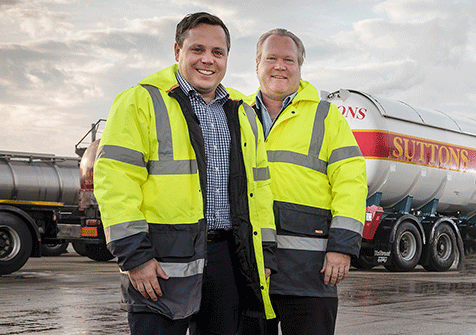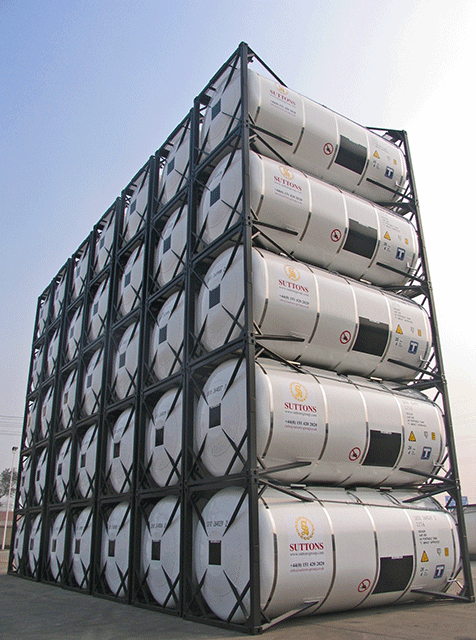
John Sutton is the grandson of Suttons Group founder Alf Sutton, who started trading in 1926 with a horse and cart.
Sutton (pictured right, with Suttons Road Tankers MD Michael Cundy) took over the reins of the family firm four years ago, being appointed group chief executive in 2013 as a replacement for Andrew Palmer when he retired. Sutton had been MD of Suttons’ International Division since 2006.
Our meeting takes place in the sumptuous Suttons boardroom, lined with oak panelling which Sutton’s father bought at auction from Lloyds of London when it moved out of its traditional head office into its glass and steel edifice in 1986.
Sutton, who has an MBA, has always worked for the family firm on the international side, working in some glamorous parts of the world before being drawn back to Lancashire.
“Now as CEO I’m effectively unemployable outside the family firm,” he laughs. “I came up through the international business and that was my career up until becoming CEO back in late 2013.
“We've had external CEOs recently and I am the first family CEO since my father 25 years ago. We'll probably end up having other external CEOs for a period of time, depending on how long I keep going. The next generation is still very young.”
But unlike some other family firms which have had to be sold because the next generation do not want to take responsibility of running a logistics business, Suttons looks set to stay in family hands.
“It generates a reasonable return for the investors, and as long as the return on investment is still there, then why wouldn’t the family be interested in retaining it?” Sutton says. “You don’t necessarily have to have a family member as CEO and we have taken steps over the past six or seven years to make it less of a family business and more of a corporate business with the family values.”
Acquisitions
Suttons Group comprises two divisions – Road Tankers and International. Following the acquisition of Imperial Tankers from Hargreaves in 2014 the UK Road Tankers business turns over around £70m while the International ISO tank operation, which has also made a series of overseas acquisitions in recent years, brings in £90m.
“The International business has been through a difficult time,” says Sutton. “There have been a lot of new entrants into that market, coupled with a slight dip in demand on the global market.”
ISO tanks are tanks contained within standard ISO container-sized frames that can be carried on container ships. It is a highly cyclical business that is dependent on global demand for petroleum products, and the current depressed oil price has seen volumes fall.
“We originally got into the international ISO tank business through a customer request,” says Sutton. “It was ICI who asked us to take products to America so we started our US office over 40 years ago.
“Then we branched into China 20 years ago on the back of a customer asking us. We now operate about 300 tanks and 18 trucks within China and we have an office with about 50 people. We have a depot where we do maintenance and repair of our equipment. We're well established in China. It's been a good growth market for us and it continues to grow.
“We now have offices in Europe, the US, Tokyo, Singapore, Malaysia and four in China. The only areas we don't focus on are South America and Africa.”
Strategic review
The UK Road Tankers business already works for several major European chemicals manufacturers and Suttons is currently undertaking a strategic review of where its opportunities lie in a post-Brexit Europe. Sutton is however keenly aware that UK logistics businesses have not had a great track record when it comes to investing on the continent.
“I don’t think we will put roots down in Europe where our existing UK customers have business going in and out of Europe,” he says. “Domestically within Europe it is a very competitive market that has already been established. But the deep sea and short sea ISO tank business is very much a focus for us.”
Barry McNally was appointed MD of Suttons International in October last year, and one of his first jobs is to oversee the purchase of 800 new baffle tanks.

“That’s a big investment for us,” says Sutton. “We’ve invested in baffle tanks which differentiates us from a lot of the global players, as that gives us more flexibility to carry the light and heavy products.”
Another part of the review is to look for more opportunities to increase the utilisation of the 450 tractor units in the Road Tankers fleet.
“We are looking at how we can get more night work,” says Sutton. “The last batch of vehicles that we’ve just ordered have been specced in the most flexible way so we could pull containers if we needed to.
“The example we talk about is the run up to Christmas where everybody needs trunking operations. How do we make ourselves capable of doing that? Our focus is still very much on the bulk hazardous liquids and gases, plus maybe some waste, so we are sticking to the knitting while filling in the gaps.”
While the integration of Suttons and Imperial has been completed, Sutton says the rest of 2017 will be a period of consolidation.
“We're open to another acquisition, as we look back at the Imperial acquisition and consider that a success,” he says. “It was a good strategic move for the group. In pockets there will be certain companies that we could look at but we're not actively out there, whereas four or five years ago we said we needed to make a big acquisition to give us critical mass.
“Now we're looking at organic growth and maybe some tactical acquisitions to bolt onto the side.”
Right size
There is always a debate about how big a UK transport operator has to be to get on the right tender lists.
“In the sectors that we're operating in, I think £70m is big enough. We're definitely punching our weight and we are definitely able to compete on buying power,” says Sutton. “Our ambition would be to grow to over £100m and we would be heading in that direction if there hadn’t been the odd plant closure around the UK.
“There has been a slight dip in demand in the UK, but that will come back and oil prices will start to increase. We’re starting to come out of that slump - but with Brexit who knows?”
Being family owned enables Suttons to stick with a cyclical business like chemicals logistics whereas larger firms need more stable business models.
“They like the contract business, open book, smaller net margin potentially but more steady for their shareholders,” Sutton says. “Whereas the chemical network business is very cyclical, so some years we make good money and other years we make much less. External shareholders don't like that.”
Even in a specialised business such as hazardous liquids and gasses Sutton says price competition remains intense and customers are constantly looking for better value.
“There's always going to be someone out there that they can use to help their negotiations with us,” says Sutton. “But it comes back to our core values and what this company stands for. It's not always all about the cheapest price. We’re always fairly close to the cheapest price but we differentiate ourselves through our health and safety and quality of service.”
Another tanker operator recently told MT that he would rather cut up his worn out barrels than sell them because a competitor will just buy them cheap and use them to offer a cut price haulage service.
“We will sell them abroad, and we will sell them to guys who we know what they do with them, so a lot of them get used for water storage on farms, for example,” says Sutton. “Normally by the time we sell a barrel it's pretty defunct, so if anyone wants to drive that then they're not going to be competing with us.”













